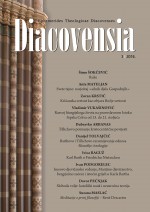TOTALITARIZAM I TJESKOBA: KIERKEGAARDOVSKA REFLEKSIJA
TOTALITARIANISM AND ANXIETY: A KIERKEGAARDIAN REFLECTION
Author(s): Bojan ŽalecSubject(s): Political Philosophy, Studies in violence and power, Fascism, Nazism and WW II
Published by: Katolički bogoslovni fakultet u Đakovu
Keywords: Kierkegaard; anxiety before the evil; anxiety before the good; Charles K. Bellinger; Nazism; Stalinism;
Summary/Abstract: The general aim of this article is to contribute to answer the question how could studying Kierkegaard help us understand the social and political life. The author illustrates Kierkegaard’s usability on the example of Bellinger’s innovative and illuminative interpretation of Nazism and Stalinism presented in Kierkegaard’s terms of anxiety and stages of existence. Bellinger interprets Hitler and Nazism as an extreme pathological example of the aesthetic stage and anxiety before the good, and Stalinism as an extreme pathological example of the ethical stage and anxiety before the evil. On that basis we can also speak about Kierkegaard’s importance for understanding the deep motivation for political violence and crime.
Journal: Diacovensia: teološki prilozi
- Issue Year: 23/2015
- Issue No: 2
- Page Range: 229-238
- Page Count: 10
- Language: Croatian

